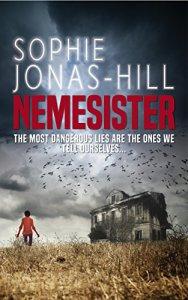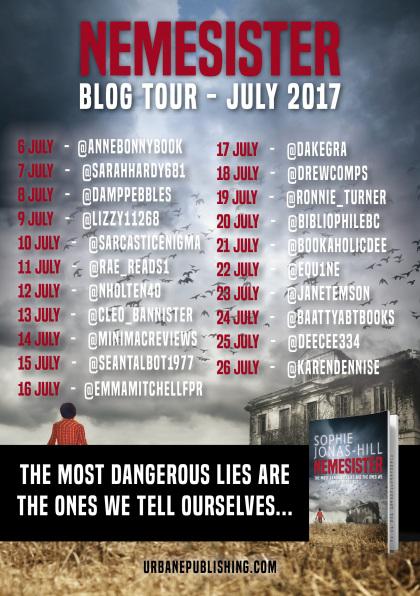
I’m delighted to be on the blog tour for Nemesister and especially thrilled that Sophie agreed to write a piece especially for my blog, one that I hope you find as fascinating as I have. So without further ado, I’ll hand over to Sophie.
Thriller writing – why Isolation is essential
At some point, every thriller writer will need to isolate their protagonist. The reasons for this are two fold – an isolated person has no one to ask for help and so has to fall back on their own devices and b) otherwise the book will probably end too quickly. As social animals, one of this things we fear most of is being alone, especially when we’re in trouble. For most of us being alone is unsettling at best, terrifying at worst, and people who crave isolation and separation are viewed with a mix of awe and distrust. As a writer, you have to think where your character might have to go to end up alone, and how sensibly they’re able to get there without it looking like a massively clumsy plot-device.
“Why goodness me,’ said John, ‘I never thought I’d actually win the all expenses paid solo trip to the Canadian Rockies, without an escort or working phone, but now I have I can’t wait to get there, even though my psychotic ex-girlfriend and ace mountaineer is still stalking me – ‘ yeah, you have to be a bit more subtle than that!
Mobile phones might be seen as a curse when trying to isolate your protagonist, but they’re actually a blessing – we’re so used to them, that when they don’t work we’re all the more vulnerable simple because we don’t make other provisions and so panic. In the old day of Nokia, they would last for days without a re-charge, which meant looking at more permanent ways to disable them – ‘Oh no,’ said John, ‘That elephant has just sat on my Nokia, I should never have left it there!’ but now, thanks to the myriad of functions on a smart phone, they only have to be a few hours from a charger and a few miles from a phone mast, and they’ve cut you off as completely as a blizzard in the olden days. I have a part in a current work in progress, where my main character finds her phone has died and, like so many of us, as she’s never bothered with a landline, as who uses them these days? – she’s suddenly as alone in a London flat over a desolate garage as she might be in a distant forest.
Once your main character is alone, they become dependant on your their own resources, which gives the reader a chance to see what they’re really made of. It’s then that you really need to know your characters, better than they know each other, so that the surprises they pull ring true. This joke encapsulates it perfectly – two friends meet a bear in the woods; one stands still in shock, the other begins to frantically change into his running shoes.
‘You can’t out run a bear!’ the first friend says desperately.
‘I know, but I can out run you,’ says the second
This is very much encapsulates the point – you might find that although your main character sounds vulnerable on paper, when it comes to it they may well be as ruthless as any criminal, and as a writer, you need to know why and what that means. Some of the best thriller writing is when the hunted becomes the hunter.
Isolation doesn’t have to be geographical; often psychological isolation is the most powerful, and the sort we fear the most as it can happen in our own heads without needing an exotic location or plot devices. You can be isolated in a crowd, if the crowd is against you – think of ‘Invasion of the body snatchers’ where the ‘free’ humans have to walk through a crowd of possessed ones and not give themselves away, knowing a single slip up and everyone will turn against them. If your character is being framed for a crime they didn’t commit, they cannot risk calling the police, or if they’ve been mis-treated by them in the past they may simply not trust them. In so many thrillers, the plot would fall apart in an heartbeat if the main character dialled 999, so you have to have a rock solid reason for them not to do so – which again comes right back to who they are, or character. Most regular people if approached by an enemy, or chased by gangsters, would go for help from those around them, so you need to know why your character will not or cannot do that. I am often to be found shouting at psychological thrillers ‘ring the police – ring the police!’ because the author hasn’t convinced me that this isn’t a sensible option, even if it might have more consequences than just a lengthy explanation, and yet it can be such a simple thing to get right. If you know your character, if you really understand them, you should know why they can’t ring the police, and that should inform everything they do.
So when it comes down to it, like with all good writing, the best kind of Thrillers thrive on the same thing as any writing – know your characters. From character comes plot, from plot comes the novel, and it’s the flaws, weaknesses and fears of your characters which will make the novel memorable.
And lets hope smart phone batteries don’t get better!
Thank you so much Sophie for visiting Cleopatra Loves Books and thank you all for reading, don’t forget to check out the other stops on the Nemesister Blog Tour

Blurb
An American Gothic thriller of deception and obsession, slicked in sweat and set in the swamps of Louisiana.
It’s a psychological mystery where the female protagonist stumbles into a deserted shack with no memory but a gun in her hand. There she meets an apparent stranger, Red, and the two find themselves isolated and under attack from unseen assailants.
Barricaded inside for a sweltering night, cabin fever sets in and brings her flashes of insight which might be memory or vision as the swamp sighs and moans around her.
Exploring in the dark she finds hidden keys that seem to reveal her identity and that of her mysterious host, but which are the more dangerous – the lies he’s told her, or the ones she’s told herself? Amazon


